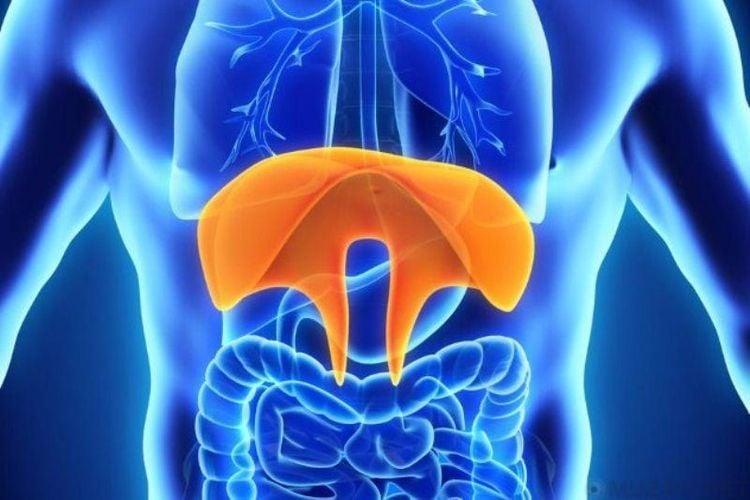This is an automatically translated article.
The diaphragm is an important organ in the respiratory system. Once the diaphragm encounters abnormal disorders, they can cause shortness of breath, hiccups.1. Where is the diaphragm? What is the function of the diaphragm?
The diaphragm is a flat, wide, dome-shaped muscle that forms a tendon-muscle wall, separating the thoracic and abdominal positions. The diaphragm plays an important role in the physiology of the respiratory system. When the diaphragm contracts, the dome of the diaphragm is lowered, helping the ribcage to expand, the pressure in the chest decreases, air is inhaled and vice versa.The anatomical diaphragm has an average surface area of about 250 cm2, when the diaphragm is lowered by 1 cm, the volume of air entering the lungs will increase by approximately 250 ml, about half of the tidal volume. When the diaphragm is lowered to 7-8 cm, the volume of air entering the lungs can be up to 2000ml. Thus, when the diaphragm is damaged, it will greatly affect the flow of air in and out of the lungs, causing respiratory failure.
2. How dangerous is diaphragmatic dysfunction?

Rối loạn chức năng cơ hoành nguy hiểm thế nào?
In the case of complete paralysis of the diaphragm, dyspnea will manifest more often. Unilateral diaphragmatic paralysis can also cause dyspnea when the patient is in the supine position. In addition, comorbidities such as heart failure, chronic obstructive pulmonary disease, obesity, myasthenia gravis... can make breathing difficulty worse with diaphragmatic dysfunction.
Shortness of breath due to bilateral diaphragmatic paralysis is also aggravated when the patient bends over, when lying with his head low or when bathing in water from the waist up. Paralysis of the entire diaphragm often causes insomnia, decreased ventilation during sleep, fatigue, poor concentration, headache, and dizziness. Some other complications from diaphragmatic paralysis are atelectasis, or inflammation of the two bases of the lungs.
3. What causes diaphragmatic dysfunction?
There are many causes of diaphragmatic dysfunction. Based on the location of the injury, people are divided into 2 main types: lesions in the brain and spinal cord such as multiple sclerosis.There are also other causes such as stroke, Arnold - Chiari deformity, quadriplegia, amyotrophic lateral sclerosis, polio, muscle atrophy due to; Diaphragmatic nerve damage in Guillain-Barré syndrome, mediastinal tumors, peripheral neuropathy, chronic infections causing demyelination of the roots and nerves, damage to the phrenic nerve in cardiac surgery , baseless.
Besides, the excessive lung strain seen in chronic obstructive pulmonary disease, bronchial asthma ... can also be the cause of diaphragm damage.
Injury to the diaphragm can also be in the general picture of diseases such as myasthenia gravis, poisoning with certain drugs, muscular dystrophy, myositis caused by infection or metabolism, prolonged use of corticosteroids... Pathological disorders Diaphragm function is also common in critically ill patients in the ICU, such as infections, multiple organ failure, prolonged artificial ventilation, diabetes, severe exhaustion, use of muscle relaxants, and cardiac dysfunction. electrolytes such as hypokalemia, phosphorus, calcium, blood magnesium...

Hen phế quản cũng có thể là nguyên nhân gây tổn thương cơ hoành
4. Treatment of Diaphragm Dysfunction
Treatment of diaphragmatic dysfunction is mainly to treat the cause such as diseases of the brain and spinal cord; supplement enough potassium, phosphorus, magnesium, calcium; good treatment of conditions that cause lung strain seen in chronic obstructive pulmonary disease, bronchial asthma; anti-infective treatment...If dyspnea symptoms increase, the patient can be mechanically ventilated intermittently or continuously. Surgical suture to stretch the diaphragm is also indicated in some severe cases where medical treatment is unsuccessful.
Vinmec International General Hospital is one of the hospitals that not only ensures professional quality with a team of leading medical doctors, modern equipment and technology, but also stands out for its examination and consultation services. comprehensive and professional medical consultation and treatment; civilized, polite, safe and sterile medical examination and treatment space.
Please dial HOTLINE for more information or register for an appointment HERE. Download MyVinmec app to make appointments faster and to manage your bookings easily.













